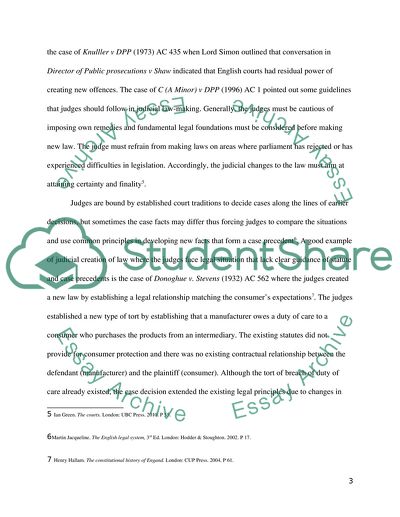Cite this document
(“In England Parliament makes the law and judges implement it, this is a Essay”, n.d.)
Retrieved from https://studentshare.org/law/1668882-in-england-parliament-makes-the-law-and-judges-implement-it-this-is-a-simply-dichotomy-in-theory-in-practice-however-the-role-of-judges-may-also-extend-to-interpreting-law-and-in-some-cases-the-judicial-function-has-seen-the-creation-of-common-laws
Retrieved from https://studentshare.org/law/1668882-in-england-parliament-makes-the-law-and-judges-implement-it-this-is-a-simply-dichotomy-in-theory-in-practice-however-the-role-of-judges-may-also-extend-to-interpreting-law-and-in-some-cases-the-judicial-function-has-seen-the-creation-of-common-laws
(In England Parliament Makes the Law and Judges Implement It, This Is a Essay)
https://studentshare.org/law/1668882-in-england-parliament-makes-the-law-and-judges-implement-it-this-is-a-simply-dichotomy-in-theory-in-practice-however-the-role-of-judges-may-also-extend-to-interpreting-law-and-in-some-cases-the-judicial-function-has-seen-the-creation-of-common-laws.
https://studentshare.org/law/1668882-in-england-parliament-makes-the-law-and-judges-implement-it-this-is-a-simply-dichotomy-in-theory-in-practice-however-the-role-of-judges-may-also-extend-to-interpreting-law-and-in-some-cases-the-judicial-function-has-seen-the-creation-of-common-laws.
“In England Parliament Makes the Law and Judges Implement It, This Is a Essay”, n.d. https://studentshare.org/law/1668882-in-england-parliament-makes-the-law-and-judges-implement-it-this-is-a-simply-dichotomy-in-theory-in-practice-however-the-role-of-judges-may-also-extend-to-interpreting-law-and-in-some-cases-the-judicial-function-has-seen-the-creation-of-common-laws.


